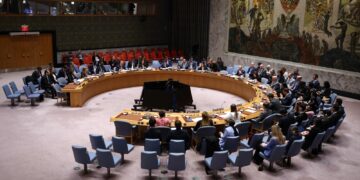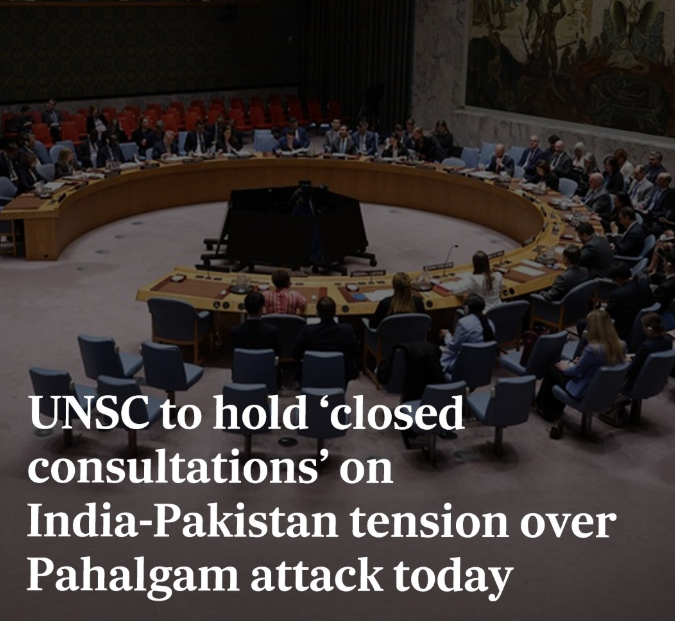The United Nations Security Council (UNSC) meeting follows Islamabad’s request for a “closed consultation” regarding the escalating tensions between India and Pakistan, sparked by the recent terror attack in Pahalgam.
The United Nations Security Council (UNSC) is set to hold closed consultations on Monday regarding the escalating tensions between India and Pakistan, following the deadly terror attack in Pahalgam that claimed 26 lives. This closed-door session comes amid growing concerns over the impact of the attack on bilateral relations and regional stability. The UNSC discussions will focus on the current situation and potential diplomatic responses to mitigate further violence.
Pakistan, shaken by India’s punitive actions, has called for an emergency meeting on the matter, according to reports from news agency PTI. As a non-permanent member of the United Nations Security Council (UNSC), Pakistan has raised the issue at a critical time when Greece holds the presidency of the 15-nation body for the month of May.
Islamabad has reportedly “requested closed consultations” regarding the ongoing tensions between two nuclear-armed neighbours. In response, the Greek Presidency of the UN Security Council has scheduled these discussions for the afternoon of May 5.
The UN Security Council comprises five permanent members with veto power: China, France, Russia, the UK, and the US. Additionally, 10 non-permanent members contribute to the discussions, including Algeria, Denmark, Greece, Guyana, Pakistan, Panama, South Korea, Sierra Leone, Slovenia, and Somalia.
In a tragic incident, twenty-six people, mostly tourists, lost their lives in the Pahalgam terror attack. In response, India has implemented several stern punitive measures against Pakistan. These actions include the suspension of the Indus Waters Treaty, the cancellation of all visas previously issued to Pakistani nationals, and a comprehensive ban on all imports from Islamabad. The move comes as part of India’s ongoing efforts to ensure security and safeguard its interests in the wake of this devastating attack.
UNSC President Evangelos Sekeris Stresses Importance of Dialogue on Indo-Pak Tensions
In a recent statement, Ambassador Evangelos Sekeris, the Permanent Representative of Greece to the United Nations and President of the UN Security Council (UNSC) for May, emphasized the significance of diplomatic discussions in alleviating rising tensions between India and Pakistan. Sekeris expressed that if a formal request were made for a meeting to address the ongoing Indo-Pak situation, it should be held. He further noted, “This could be an opportunity for both sides to voice their perspectives, potentially helping to diffuse the current tensions.” His comments underline the critical role of open dialogue in conflict resolution and promoting peace.
Greek Ambassador Sekeris emphasized that his country is in close communication with India regarding ongoing security concerns. He noted, “We are in close contact… but this is something that might happen sooner rather than later. We are preparing for it.”
The Ambassador went on to highlight the significance of India’s struggle with cross-border terrorism, particularly from Pakistan, stressing that the issue is crucial. “As I have mentioned previously, as a matter of principle, we strongly condemn any act of terrorism. This includes the heinous attack that occurred in Kashmir, which we unequivocally condemned,” he added.
Sekeris emphasized that while the United Nations Security Council (UNSC) firmly condemns terrorism in all its forms, it is equally concerned about the rising tensions in the region.
He noted, “Two very large countries are involved. Of course, India is much larger than Pakistan.”
India’s External Affairs Minister, S. Jaishankar, has been actively engaging with members of the United Nations Security Council (UNSC) in the wake of the Pahalgam terror attack. Over the past few weeks, Jaishankar reached out to all Council members, except China and Pakistan, to emphasize the need for justice against those responsible for the heinous attack.
During these conversations, Jaishankar underscored the importance of bringing to justice not only the perpetrators but also the planners and backers of the attack. His diplomatic efforts reflect India’s firm stance on countering terrorism and its commitment to holding those behind such attacks accountable.
In addition to his discussions with UNSC members, Jaishankar also had a constructive conversation with Greek Foreign Minister George Gerapetritis. The two leaders discussed the Pahalgam attack, and Jaishankar expressed India’s appreciation for Greece’s strong position against cross-border terrorism. “Our Strategic Partnership reflects the depth of our ties,” Jaishankar remarked, reinforcing the growing collaboration between the two nations.
Moreover, the Indian Minister spoke with key global leaders, including UN Secretary-General Antonio Guterres, Russian Foreign Minister Sergey Lavrov, US Secretary of State Marco Rubio, UK Foreign Secretary David Lammy, and French Foreign Minister Jean-Noël Barrot. These discussions serve as a testament to India’s diplomatic outreach and its commitment to combating terrorism on the global stage.
UN Urges India and Pakistan to Exercise ‘Maximum Restraint’ Following Pahalgam Terror Attack
In the wake of the devastating terror attack in Pahalgam on April 22, the United Nations has called on India and Pakistan to exercise “maximum restraint” to avoid further escalation of tensions. UN Spokesperson Stephane Dujarric condemned the attack, expressing deep concern over the violence and its potential to heighten tensions between the two nuclear-armed neighbors.
Dujarric emphasized the importance of resolving the ongoing issues between India and Pakistan through “meaningful mutual engagement” and peaceful dialogue. He reiterated the UN’s commitment to supporting efforts that lead to lasting peace in the region.
This call for restraint follows recent diplomatic discussions initiated by UN Secretary-General Antonio Guterres, who separately spoke with India’s External Affairs Minister S. Jaishankar and Pakistan’s Prime Minister Shehbaz Sharif. Guterres condemned the Pahalgam attack and urged both nations to take steps towards de-escalating the situation to prevent any further violence.
The international community remains hopeful that both India and Pakistan will heed the UN’s call for peace and cooperation in the face of heightened tensions.
Table of Contents
Read Also















 Categories
Categories










